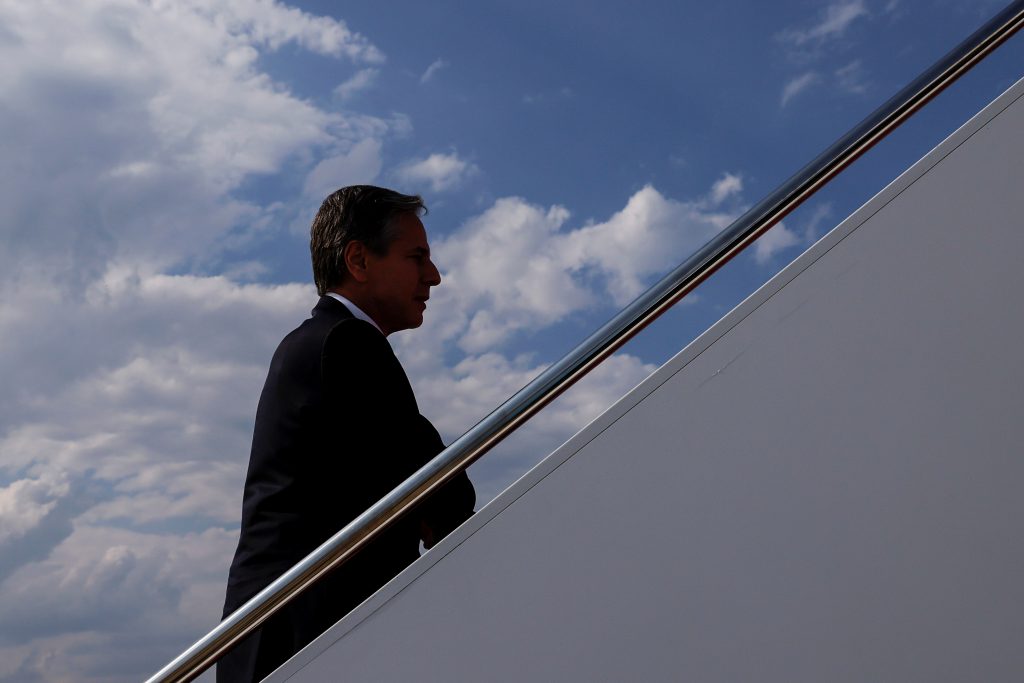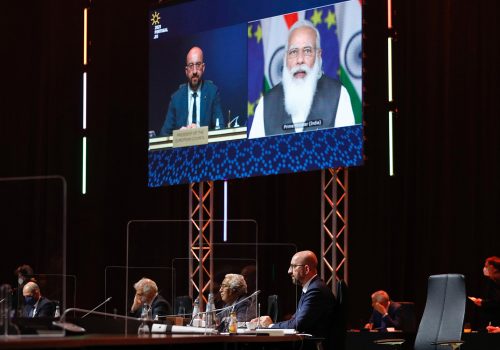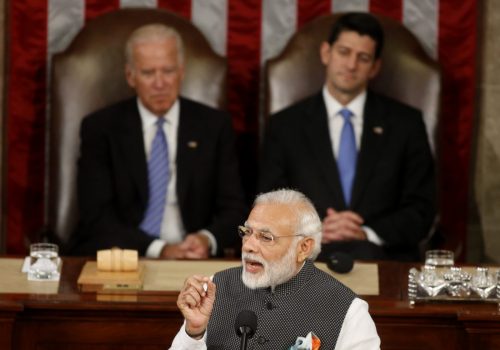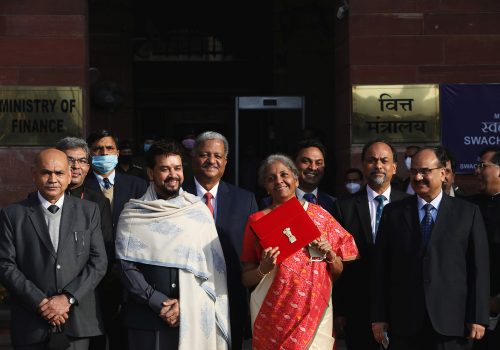American Secretary of State Antony Blinken makes his first visit to India this week to prepare for the Quad summit and bilateral meetings between President Joe Biden and Prime Minister Narendra Modi. Below, South Asia Center experts react to the meeting and offer insight into what to expect.
A deeper US-India relationship
Certainly Secretary Blinken’s trip to India will contribute to the cementing of the US-India strategic relationship, which flourished during the Trump administration. Reportedly, he will discuss preparations for a possible Prime Minister Modi trip to the United States in September and share perspectives with External Affairs Minister Jaishankar on a variety of strategic subjects, including the path forward for the Quad. The subject that will be most absent from these discussions will be trade and commercial relations. Of course, it would be somewhat outside Secretary Blinken’s remit to have an extended exchange on trade, but one should expect it to generate a new round of commentary on the poor state of the trade relationship.
This mismatch between positive strategic dynamics and deteriorating trade relations should be a cause for concern. Particularly as developments in both countries render the ubiquitous slogan of shared interests as the oldest and largest democracies a bit hollow, the failure to prioritize trade and reverse its downward trajectory can undermine shared ambitions to make this the most important bilateral relationship of the 21st century. We can only hope that as Secretary Blinken and Minister Jaiskankar chart a course forward on strategic ties, their work might inspire President Biden and Prime Minister Modi to press their trade ministers, U.S. Trade Representative Tai and Minister Goyal, to find early opportunities for quality time to discuss a grander vision on trade.
Mark Linscott is a senior fellow with the Atlantic Council’s South Asia Center. He served as the assistant US Trade Representative (USTR) for WTO and multilateral affairs from 2012 to 2016, with responsibility for coordinating US trade policies in the WTO, and as the assistant USTR for South and Central Asian affairs from December 2016 to December 2018.
Revitalizing and refreshing the US strategic partnership with India
When Secretary Blinken arrives in New Delhi this week his overarching task will be to revitalize and refresh the US strategic partnership with India. The Biden administration will want to have India’s support and regional leadership on a wide range of issues, including Covid-19, climate change, China, security in the Indo-Pacific region, and cooperation on security, anti-terrorism and cyber. High on that list will be the impact on India and the region of President Biden’s unexpected decision to hastily withdraw US (and thus international) forces from Afghanistan, a decision which many in India consider ill-advised and potentially harmful to Indian security.
A State Department briefer notes Blinken would welcome India’s “shared commitment to peace” and wants to explore how the two countries can work together to achieve a stable and secure Afghanistan. While viewing the US military presence as the lynchpin of regional security, Indian policy circles have long feared that the US did not have a workable long term strategy for Afghanistan. I suspect that Blinken’s Indian interlocutors would have preferred that a genuine discussion with India, a key democratic partner, had taken place before Biden’s decision. India considers the preservation of democracy and stability in the Islamic Republic of Afghanistan a strategic asset, and has played a low-key, valuable role to that end. Despite its own stresses India has provided Afghanistan some $3 billion is development assistance, has provided training for civil servants and scholarships for Afghan students, has supported trade with Afghanistan and provided a new home for the Afghan parliament as a symbol of its support for democracy. Now, New Delhi will fear the resurgence of authoritarianism and islamist extremism in the region, and that the Biden administration has abandoned the field without a plan for securing our shared interests, and the gains made, in Afghanistan.
Ambassador James Cunningham was US deputy ambassador to Afghanistan in 2011 and US ambassador to Afghanistan from 2012-2014. He is also a nonresident senior fellow with the Atlantic Council’s South Asia Center.
Addressing a wide range of issues with China at the forefront
U.S. Secretary of State Blinken’s visit to India comes at a time when bilateral relations are entering a new phase in strategic planning and prioritization for both nations.
Expecting a Quad summit by the end of the year and in the wake of a U.S. military pullout from Afghanistan, Mr. Blinken is expected to be quizzed about America policy toward South Asia and counterterrorism as the Taliban gain momentum on the Afghan battlefield and Indo-Pakistani relations experience a new low.
Mr. Blinken is expected to draw Indian attention to and support for a practical political roadmap that needs stronger regional buy-in as American troops leave Afghanistan after 20 years.
Both nations will focus on trade and economic cooperation as well as existing risks posed by the COVID-19 pandemic and climate change.
The main topic of this visit, however, will be China. Both countries will share thoughts and compare notes on China’s rise and expanded intercontinental geopolitical and geo-economic footprint.
That discussion will feed into strategic planning ahead of the critical Quad meeting later this year.
Ambassador Samad is a nonresident senior fellow in the South Asia Center and former Afghan ambassador to France and Canada.
A focus on defense ties and the health of both democracies
Secretary Blinken’s first official visit comes at an important time in the partnership. India finds itself in the now familiar position of enjoying strong support from a new U.S. administration.
India’s pivotal role in the revitalized Quad initiative, and the related issues of COVID-19 response and recovery in the Indo-Pacific will be front-and-center. Both governments will consult closely on shared regional security interests. An authoritarian China’s more assertive foreign policy should feature prominently. The democracies will also likely be seized with the growing urgency posed by the climate crisis, a top administration priority, with COP26 in November.
Defense ties will remain high on the agenda, as the two countries are keen to see this area continue to flourish in response to the shifting regional power balance. At the same time, the high-level visit is an opportunity to re-center the countries’ natural strength–their open societies. The topic was not a priority for President Biden’s predecessor. Public health (including related science and technology collaboration), education, Internet freedom, and gender issues are all areas that are ripe for deeper cooperation. A return to the solid bedrock of openness would constitute more fertile ground for an enduring and broad-based partnership.
Despite their shared democratic traditions, the health of both democracies has been recently called into question. The current administration has sought to restore US leadership in the world, frankly acknowledging the ongoing challenge to liberalism at home while emphasizing the importance of democratic values overseas. The latter has long been a sensitive subject for India. The Secretary will listen carefully to his counterparts, while perhaps discreetly signaling the renewed significance of values in the relationship.
Atman Trivedi is a nonresident senior fellow at the Atlantic Council’s South Asia Center and has over twenty years of foreign policy and trade experience with expertise in India and the broader Asia region.
Building a partnership for regional peace and development in South Asia
As Secretary of State Antony Blinken heads to New Delhi, he will be sending a powerful signal not only for his hosts in India but also for other countries in the region about the continuing importance the United States attaches to its economic and security relationship with India. China and Afghanistan will figure in the discussions. But Pakistan ought to be a key part of the Delhi dialogue too, especially in the context of regional peace, stability, and development. Islamabad will be watching this visit to see if the US tries to take a more regional rather than Indo-centric view of the greater South Asia region.
As an old friend of India. Secretary Blinken would do well to raise, in private, US concerns about the human rights and democracy issues relating to Kashmir as well as within India itself. India remains allergic to public advice on its shortcomings. Secretary Blinken understands that well, given his previous experience with the region. So does President Joe Biden. But their voice on human rights issues must be heard by their Indian hosts and the Indian public.
Kashmir remains at the heart of continuing Indo-Pakistan tensions, and is a roadblock, among other things to regional connectivity and trade that could benefit India, Pakistan, and Afghanistan and the people of Kashmir.
On Afghanistan, while lauding India’s investments exceeding some $3 billion, the future relationship of India as a near neighbor to whatever political system emerges in Kabul is unclear, given India’s traditional distance from the Taliban. As a senior US diplomat put it recently: “We expect that all the countries in the region have a shared interest in a stable and secure Afghanistan going forward and so we will certainly be looking at talking with our Indian partners about how we can work together to realize that goal.”
Bringing India and Pakistan to the table on Kashmir and Afghanistan must remain a key part of the US agenda for South Asia. While China and security issues loom large, in the end it is economics and development that will produce stability in this key part of the world. India remains an important partner of the United States. However, in the regional context, Pakistan, Afghanistan, and even Iran will be key to the growth and development of the greater South Asia region. China knows that and is building relationships in that direction. Linking Central Asia to South Asia is the best US counter to China’s Belt and Road Initiative, bringing jobs, energy, and economic integration. The United States can and must play a role in that regard rather than cede that important ground to China.
Shuja Nawaz is a Distinguished Fellow at the South Asia Center of the Atlantic Council in Washington DC. He was the Center’s founding director in 2009.
It’s time for a difficult conversation with Delhi
The U.S.-India relationship presently presents the U.S. foreign policy establishment with a paradox. The degradation of India’s democracy challenges the logic underlying the relationship. If China is to be contained because it is authoritarian, then why should the United States bolster the power and prestige of increasingly authoritarian India? Would this not help Delhi become what Washington fears of Beijing?
With the Obama administration’s “pivot to Asia” and the adoption of the term “Indo-Pacific” under the Trump tenure, India came to occupy the center stage of U.S. foreign policy. The hope is that India would serve as a counterweight to an “increasingly assertive” China. Under the Biden administration, the key mechanism for realizing this hope has been “the Quad,” or the U.S.-Australia-India-Japan Consultations. Experts see this informal grouping as representing a “potential paradigm shift” from “ceremonial, process-centered multilateral institutions” like the ASEAN Regional Forum to a “functional, results-oriented problem-solving institution.” Beijing sees it as reflecting a “Cold War mentality,” an outdated view of the world.
Washington is also trying to build stronger military ties with Delhi. The two countries’ total defense trade went from near zero in 2008 to over $20 billion in 2020. In 2016, the United States designated India as a Major Defense Partner in order “to elevate” the defense partnership “to a level commensurate with that of the United States’ closest allies and partners.” In 2018, India’s status was elevated to Strategic Trade Authorization tier 1, thereby allowing it to receive license-free access to a wide range of military and dual-use technologies regulated by the Department of Commerce.
In 2019, the United States and India conducted their first-ever tri-service (ground, naval, and air forces) exercise, called Tiger Triumph. The focus was on disaster response and humanitarian aid delivery, but observers described it as “an improvement over the type of joint military exercises that the two countries have held to date” and “an indication that defense relations between the two sides are steadily deepening.”
Yelena Biberman is a nonresident senior fellow at the Atlantic Council’s South Asia Center, an associate professor of political science at Skidmore College, and a fellow at the Modern War Institute at West Point. Her book, Gambling with Violence: State Outsourcing of War in Pakistan and India, was published by Oxford University Press in 2019.
Read Yelena Biberman’s full article here

The South Asia Center is the hub for the Atlantic Council’s analysis of the political, social, geographical, and cultural diversity of the region. At the intersection of South Asia and its geopolitics, SAC cultivates dialogue to shape policy and forge ties between the region and the global community.
Related Content
Image: U.S. Secretary of State Antony Blinken boards an aircraft as he departs Washington on travel to New Delhi, India and Kuwait City, Kuwait at Joint Base Andrews, Maryland, U.S., July 26, 2021. REUTERS/Jonathan Ernst/Pool



